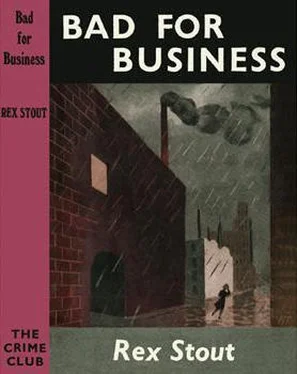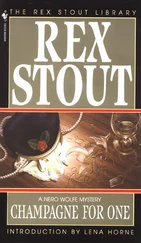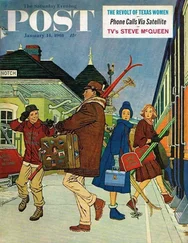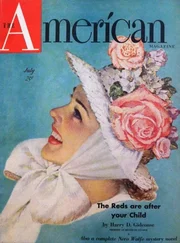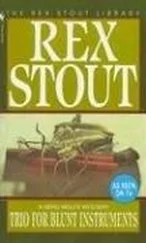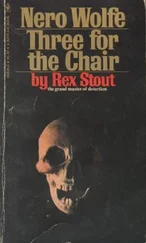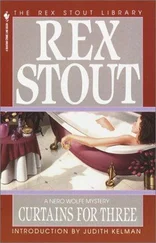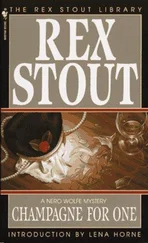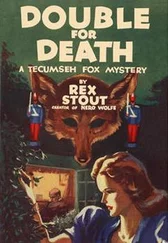A police car with a uniformed sergeant at the wheel was there at the curb.
“You can come with me,” Damon said gruffly, opening the door.
“I intend to.” Fox climbed in and slid to the corner. “But we’ll go farther and faster if you’ll tell him to stop at 914 East 29th.”
Damon, sitting down, darted a glance at him. “No. I stopped there on my way uptown, and he’s not there. I left a man in front and I’ll be notified—”
“I don’t like to contradict you, but I’m telling you. Stop at that address and I’ll show you something.”
“You may,” said Damon grimly, “show me several somethings before the night’s ended.”
“All right, but let’s begin with that.”
Damon leaned forward and spoke to the driver, and the driver nodded respectfully. The car swung into Park Avenue and sped downtown.
“You might as well be telling me now,” said Damon, “how you got on to Judd and go on from there.”
“Nope. Not yet. Don’t start pushing.”
“Did you send me that box?”
“Good God, no. If I had got my hands on that box—”
It had started to rain, a sneaking chilly drizzle, and Fox cranked the window shut on his side. His toe was touching the leather bag which contained the box, and his mind was dancing around the box itself, or rather, around the question, who could conceivably have sent it to the police? It was absolutely weird and completely unaccountable. He progressed beyond that not at all by the time the car rolled to a stop and he jumped out at the heels of the inspector, who warned the sergeant to guard the bag.
A man in a rubber raincoat came from the protection of a near-by doorway and joined them in the vestibule. He responded to the inspector’s inquiring glance:
“He hasn’t shown up.”
“Well,” Damon said, “I suppose you’d better — hey! Where the hell did you get that key?”
“Borrowed it.” Fox inserted the key and turned it, and opened the door. “Ask me no questions and I’ll tell you no lies. We won’t need any help.”
Damon told the man in the raincoat to stay on post and followed Fox up the dim and dismal stairs. At the top of the four flights he was puffing a little. He watched, inscrutably, saying nothing, at the door in the rear, as Fox tried one of the keys on a ring, abandoned it for another which worked, turned the knob, and swung the door wide. They entered and Fox shut the door.
“I’ll take those keys,” Damon said. “And if this turns out to be your method of introducing me to another sudden death in the Tingley family—”
He stopped because evidence was before him that his surmise was wrong. Fox had opened the door to the kitchen and they had crowded inside; and the gleam of wrath and hate in the deep-set eyes of the Tingley there on the chair against the water pipe proved that there was plenty of life left in him. Damon stepped over and took a look at the tape and the knots, and turned to Fox:
“Do you know who did it?”
“Certainly. I did.”
“Oh. Nice job. You sure are—” He sighed a little. “I suppose you fixed his jaw, too. Undo him.”
Philip Tingley stood, swaying, clinging to the rim of the gas stove. He tried to open his mouth, grimaced, mumbled something hoarse and unintelligible, and gave it up.
“Here, take a sip of water.” Damon proffered a glass. Phil obediently tried it, and swallowed some, went to clear his throat, and winced.
“Bring him inside,” Damon said, and led the way to the room at the end of the little hall. Phil followed him, walking none too steadily but prodded on by Fox from the rear. Damon arranged the three chairs so that the light would be full on Phil’s face — not, certainly, because it was pleasant to look at — and they sat.
But Damon immediately got up again. “I’m going to get that bag. And have a phone call made.” He eyed Fox. “If you try something like taking him down the fire escape and putting him in the furnace—”
He strode out.
Phil’s eyes flashed at Fox from beneath their jutting ledges, and he articulated harshly, “You’re stronger than I am. I know that.” His hands twitched. “If you weren’t—”
“Forget it,” said Fox unfeelingily. “What do you expect me to do, hold my hands behind my back and let you take three shots? Anyway, you’ve got a jaw like an alligator.”
“She came.” There was a quiver under Phil’s harshness. “She came, and you — what did you do? Take her to the police?”
“Wait till the inspector comes. He’ll be here in a minute.”
Phil uttered a sound, half growl and half moan, raised his hand to his swollen jaw, and began a series of cautiously experimental touches and pressures, Fox watching interestedly. That pantomime was still in progress when Damon came tramping in carrying the leather bag, which he deposited on the floor beside his chair.
Fox suggested to him, “If that driver of yours does shorthand—”
“No, thanks,” said Damon dryly. “There’s enough high explosive in this damn thing to blow me to Staten Island. The district attorney will be here in half an hour, and if he wants to bring in a stenographer he can.” He gazed at Phil with unconcealed disfavor. “Fox here says it was him that operated on you and tied you up. Tell me about it.”
“If you start it like that,” Fox objected, “we’ll be here all night. I can give you a brief synopsis—”
“Let’s hear it.”
“Well,” Fox cocked his head, “where’ll I start? With a paradox. Philip didn’t like the kind of money we have, so he wanted to get hold of a lot of it, to be used for the purpose of proving that it’s no good. His foster father, not liking Philip’s dislike of money, refused to let him have any, and went so far as to disinherit him, practically, and showed him the will in which he did that. Philip’s curiosity was aroused by a bequest to Guthrie Judd of a certain box, and the first time he found himself alone in his father’s office with the safe unlocked, he explored and found the box and swiped it. He busted it open and examined the contents — what’s the matter?”
Phil was making noises. “That’s a lie!” he blurted.
“What’s a lie? That you busted it open? Show him the box, Inspector. Why not?”
Damon, after a momentary hesitation, unfastened the bag and produced the box. Phil, gazing at it fascinated, emitted an ejaculation, started up, and was apparently going for it; but it was merely such an involuntary movement as a devoted mother might make at sight of a beloved child restored from danger. He sank back into his chair, still gazing at it.
“We might as well,” said Fox, “clean up as we go along. What was the lie?”
“You’ve got it,” Phil mumbled, dazed.
“We sure have. What was the lie?”
“I didn’t bust it open.”
“No?” Fox stretched to point at the lock. “Look. Metal gouged and twisted. The lock bar wrenched up—”
“I can’t help that. I didn’t do it. I took it to a locksmith and told him I had lost my key and had him make one that would open it.”
“What locksmith? Where?”
“Over on Second Avenue, near 30th. I don’t remember the name.”
“All right, we’ll pass that for the present. Resuming the synopsis. Stop me at lies. Philip discovered his mother’s name was Martha Judd, and since the will and the inscription on the envelope both mentioned Guthrie Judd, and it was easy to learn that he had a sister named Martha, that was that. It was also easy to get a folder of the bank of which Judd was president and learn that its resources were over half a billion dollars of no-good money.” Fox looked at Phil approvingly. “I like that little touch. Shows a good head for detail.”
Читать дальше
